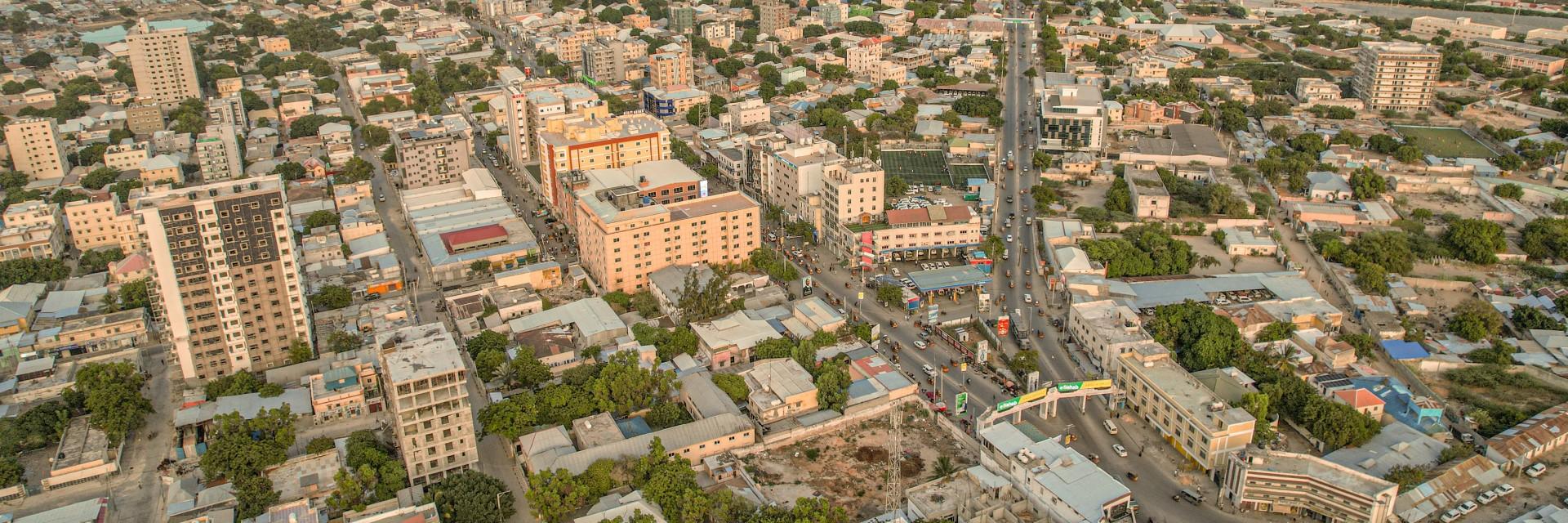Mogadishu, 23 June 2025 – At the launch of the Somalia Centennial Vision 2060 (CV2060) today, one of the top United Nations officials in Africa commended the country for the progress it has made so far and for it outlook and future plans.
“We are convening today against the backdrop of a deeply uncertain world marked by climate volatility, geopolitical conflict and economic instability – and Africa, in particular, acutely feels these shocks. But what do nations do when faced with adversity?” the Executive Secretary of the UN Economic and Social Commission for Africa (ECA), Claver Gatete, asked the gathering in the Somali capital.
“Some wait. Others forge ahead. Today, Somalia has chosen the latter approach,” he continued. “Through its Centennial Vision 2060, the country is reclaiming its voice, rewriting its story and reinventing its future with collective resolve. The CV2060 is a clear declaration that Somalia will no longer be bound by the weight of its past, but is committed to carving a future defined by its own ambition.”
Mr. Gatete was one of many international community representatives attending the launch in the Somali capital. From the world body, attendees also included the UN Resident Coordinator for Somalia, George Conway, who also serves as a Deputy Special Representative of the Secretary-General for the Horn of Africa country.
From the Somali side, attendees included President Hassan Sheikh Mohamud and Prime Minister Hamza Abdi Barre, as well as a host of ministers and other government officials.
CV2060 ties into the country’s ongoing process of rebuilding its institutions and economy after more than two decades of conflict and instability.
Guiding development
The president announced in January 2023 that Somalia would develop CV2060 as the foundation for the country’s future development path. It would guide all future development planning frameworks for building essential national institutions for recovery and reconstruction as the country dealt with weak institutional capacity, fragile security and complex politics – all of which have constrained economic recovery and reconstruction.
“Its main objective is to formulate a shared long-term strategy and commitment to fundamentally transform Somalia into a middle-income country with a capable state with the ability to effectively serve its people by 2060,” the National Economic Council (NEC), states.
According to the NEC, among the most pressing economic and social challenges are: a lack of enabling environment in the form of prevalent state fragility and continued insecurity in some areas and poor infrastructure limiting economic activity; the prevalent food insecurity and environmental degradation; poor economic and social indicators, high unemployment, and internal displacement and outward migration.
African examples
In his remarks, Mr. Gatete pointed to the example set by “another African renewal story” – that of his home country, Rwanda.
He cited the 1994 genocide against ethnic Tutsis there that led to the loss of more than one million lives, along with the destruction of most of the country’s social infrastructure.
“Even before the genocide, infrastructure was rudimentary, access to quality education and health was limited, and economic productivity was stifled by a huge informal sector and aid dependency,” Mr. Gatete said. “Thereafter, the government embarked on a long journey to rebuild the country from emergency phase to reconstruction and reconciliation to sustainable development.”
“And in less than three decades,” he added, “the country transformed itself into one of Africa’s most compelling examples of post-conflict development, driven by shared vision, discipline and inclusive leadership – it is important to stress that Rwanda’s success did not come from chance. It was the product of long-term strategic planning, institutional reform and an unshakeable commitment to people-centred development. Somalia, too, possesses that same potential. So why not Somalia? And why not now?”
The senior UN official noted Rwanda’s Vision 2020, launched in the year 2000, which had also provided a strategic framework for rebuilding, with a key characteristic being that ownership and inclusivity were central, and implementation hinging on structured seven-year strategic plans, backed by evaluations and performance contracts.
“Within a short time, measurable progress had been recorded in governance, health, education and infrastructure,” Mr. Gatete added.
He also pointed to other African countries – Côte d’Ivoire and Mauritius – which have demonstrated that it is possible to overcome challenges and achieve meaningful development.
“The common thread in these examples is vision matched with discipline in execution. Thankfully, Somalia is not starting from zero, so I have no doubt that the country can also carve a similarly ambitious course and succeed,” Mr. Gatate said.
“The ECA will continue to partner with Somalia to replicate and transfer knowledge and success stories of resilience and renewal, as well as delivering impact,” he added. “With greater commitment and working together, 2060 will become a lived reality for the Somali people.
ECA support
The Economic Commission for Africa has supported Somalia in its journey toward regional and global integration—through the development of its National AfCFTA Strategy, its WTO accession process, and the strengthening of public-private partnership frameworks. ECA has also contributed to Somalia’s efforts in building advancing inclusive data systems, including civil registration and vital statistics, which are foundational to evidence-based policymaking.
Covering the African continent, ECA is one of five regional commissions which operate as economic laboratories, shaping policies that navigate development challenges specific to their regions. They analyze regional trends, identify policy strengths, and bring diverse stakeholders together – including governments, financial institutions, and businesses.

